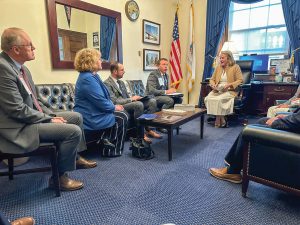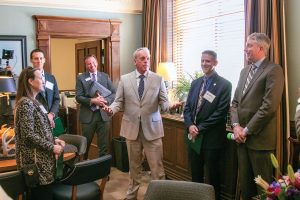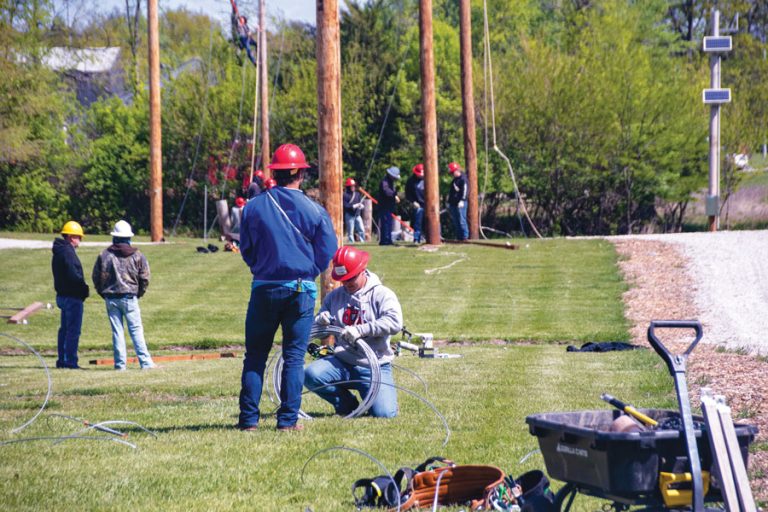More than 2,000 representatives from electric co-ops across the nation ascended Capitol Hill in Washington, D.C., April 16-19, to meet with federal representatives and advocate for priorities important to rural America.

From Illinois, more than 40 leaders from 19 entities representing Illinois electric cooperatives joined forces to advocate for rural Illinois at a national level. Just a few weeks later on May 2, more than 60 leaders representing 24 Illinois electric cooperatives gathered in Springfield to meet with their senators and representatives to advocate for the electric co-op program.
“It is important that electric cooperative leaders engage with our elected officials to discuss the issues impacting our co-ops and their consumer members,” said Nick Reitz, vice president of government relations at the Association of Illinois Electric Cooperatives. “These events provide a great opportunity to advocate for our co-op priorities, share the impact of proposed legislation and tell our co-op story.”

These events help to familiarize elected officials with the cooperative program and start a conversation. In addition to telling the electric cooperative story, co-op leaders also discussed the ongoing supply chain challenges that impede the ability of access to key components and materials that result in reliability concerns.
On Capitol Hill, co-op leaders met with U.S. Senators Dick Durbin and Tammy Duckworth, U.S. Representatives Mike Bost, Nikki Budzinski, Darin LaHood and Mary Miller, and the staff of Representative Eric Sorensen to discuss several key topics.
The federal permitting process needs to be modernized. Congress must pass legislation to create a more streamlined permitting process. The process for conducting federal environmental reviews must be more efficient and streamlined to reduce costs and provide more certainty to electric co-ops across the nation to maintain affordable and reliable energy services.

Supply chain challenges must be alleviated. Electric co-ops need help from Congress to address labor shortages, invest in long-term manufacturing growth and incentivize increased domestic steel production. Ongoing supply chain constraints impede the ability of co-ops to access key components and materials, which creates safety, cost and reliability concerns.
Members of Congress were also asked to support co-op priorities in the farm bill by preserving Rural Utilities Service (RUS) electric infrastructure financing, expanding rural broadband access, and maintaining U.S. Department of Agriculture (USDA) rural development tools.
Congress must oppose policies that would lead to higher electricity costs for rural families, businesses and communities. Electric co-ops use electric infrastructure financing programs and new clean energy initiatives at the RUS to support the deployment of modern electric infrastructure.

Congress must continue to fund rural broadband programs that meet the unique challenges of serving hard-to-reach areas. A reliable broadband connection is vital for rural America and creates new ways to live, learn and earn in rural America.
The Rural Economic Development Loan and Grant program, the Rural Cooperative Development Grant program and the Rural Energy Savings program help create jobs, lower costs and boost home energy efficiency. Congress should preserve these important programs so electric cooperatives can continue improving lives in rural America.
While families and businesses in Illinois expect the lights to stay on at an affordable cost, the nation’s energy policies must meet these fundamental expectations. Electrification of the economy, the disorderly retirement of existing generation, permitting challenges, supply chain issues and the availability of natural gas all impact the reliability of the electric grid.
Electric co-ops want to work toward meaningful solutions to address the reliability challenges spreading across the nation. They believe policymakers should recognize the need for time, technology development and new transmission infrastructure while supporting policies that include all energy sources.








